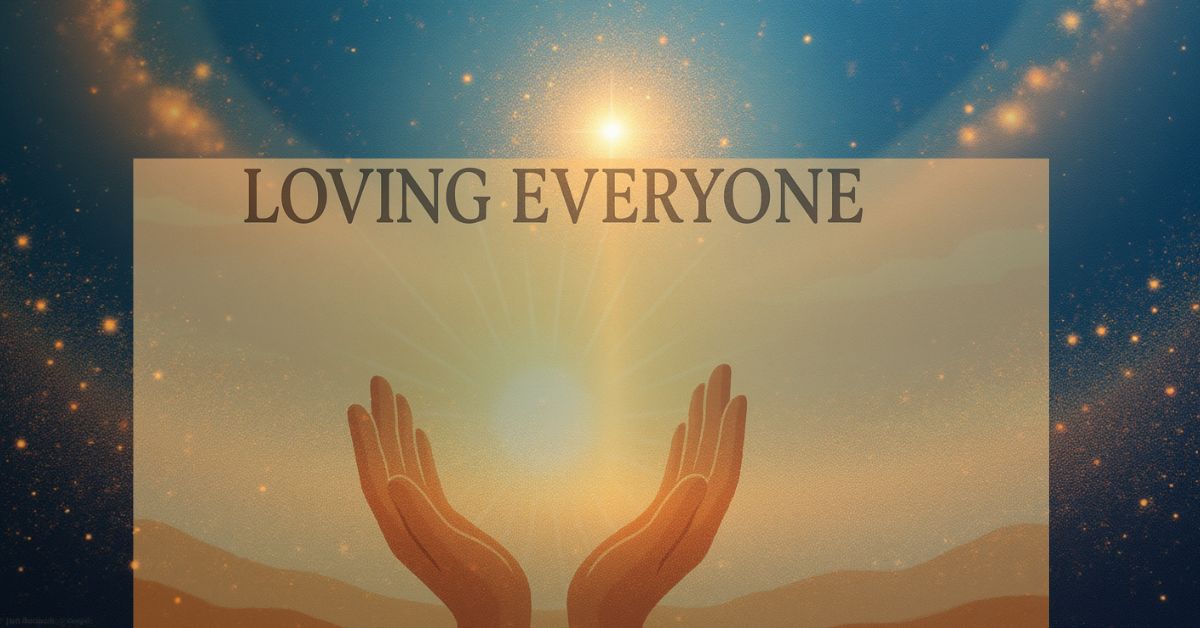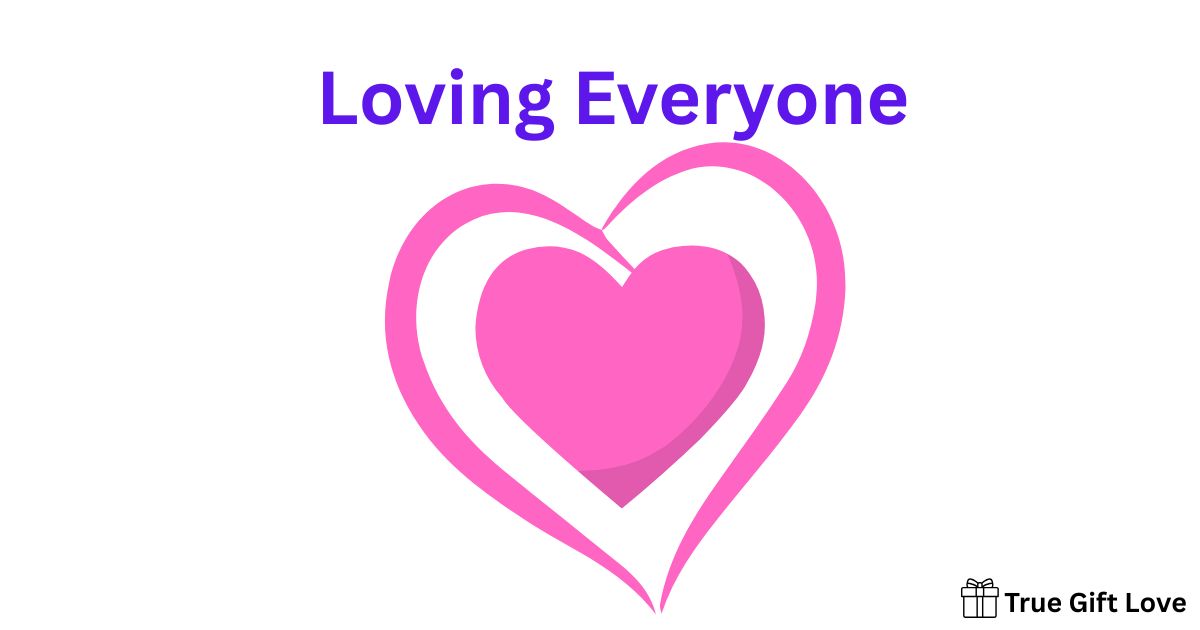Loving Everyone—Particularly the Ones You Don’t Want To
There’s someone I used to avoid at all costs.
Every time their name came up, my chest tightened, and a flood of old anger would rise like heat from a fire I thought had long burned out. They had once hurt me deeply, not in a dramatic, movie-worthy way, but in the quiet, soul-bruising way that lingers. A broken trust, a careless word, a lack of empathy when I needed understanding most.
For a long time, I told myself I had moved on. I didn’t think about them much. But now and then, when their face crossed my mind, I’d feel that old resentment flicker. It was like an ember still glowing beneath the ashes of “I’m over it.”
One day, during a meditation practice, I caught myself sending silent wishes of love and peace to people I cared about, friends, family, and mentors. Then the instructor said softly, “Now extend that same love to someone you find difficult to love.”
My stomach clenched.
I knew immediately who that person was.
For a few moments, I resisted. It felt wrong, even unfair. Why should I send love to someone who had caused me pain? But as I sat there in stillness, I realized something: the person still had power over my peace because I hadn’t fully released the story I carried about them. My judgment, my anger, my silent resentment, they weren’t hurting them anymore. They were hurting me.
That realization cracked something open.
The Weight of Judgment
It’s easy to love the people who make us feel safe, seen, and valued. But when it comes to those who trigger our pain, disappoint us, or see the world differently, love suddenly feels conditional. Judgment creeps in, whispering that they don’t deserve kindness.
But judgment, I’ve learned, is like holding a burning coal and hoping the other person gets burned. It only hurts the one who clings to it.
Letting go of judgment isn’t the same as excusing harmful behavior. It’s about freeing yourself from the emotional chains that bind you to the past. It’s recognizing that everyone, yes, everyone is walking through life carrying unseen burdens, fears, and wounds. Sometimes, people project their pain in ways that cause harm. And while that doesn’t make it okay, it does make it human.
When I began to see that person not as “the one who hurt me,” but as a fellow soul stumbling through their own lessons, something shifted. The bitterness softened. The story loosened its grip. And in that softening, I found space for compassion.
Choosing Love as a Path to Inner Peace
Choosing love for everyone, especially those who challenge us, isn’t an act of weakness; it’s an act of strength. It’s saying, “I refuse to let your actions harden my heart.”

Love doesn’t mean inviting toxic people back into your life or denying the pain they caused. It means wishing them healing from afar, so you can finally reclaim your own peace.
When you practice love and forgiveness, you’re not pretending the wound never happened. You’re simply choosing not to let it define your emotional landscape anymore. That’s where true inner peace begins.
Loving everyone doesn’t mean we stop having boundaries; it means we stop carrying hatred across them.
Practical Reflections for Healing Through Compassion
Here are a few mindful practices that helped me and might help you cultivate love for everyone, even when it feels impossible:
- Visualize their well-being.
Close your eyes and picture the person who challenges you most. Imagine them surrounded by light or warmth. Say silently, “May you be happy. May you be free from suffering.” You don’t have to believe it right away, just practice. Over time, your heart begins to follow your intention. - See them as a mirror.
Often, the traits we dislike in others reflect something unhealed within ourselves, an insecurity, a fear, or a part of us we’ve yet to accept. When we recognize this, the person becomes not an enemy, but a teacher. - Set an intention for peace.
Before responding to someone who triggers you, take a deep breath and ask yourself, “What would peace look like in this moment?” Respond from that space, not from anger. - Remember their humanity.
Even people who act cruelly are often operating from pain. You don’t need to excuse their behavior, but you can remember that they, too, are searching for love and meaning in their own imperfect way. - Forgive for your own freedom.
Forgiveness isn’t about saying “it’s okay.” It’s about saying, “I won’t carry this anymore.” When you forgive, you open a door back into your own heart.
The Ripple Effect of Kindness
When we begin to extend love and compassion beyond the boundaries of comfort, something extraordinary happens: we start to see the world differently.
The stranger who cuts us off in traffic becomes a tired parent rushing to work.
The friend who withdrew without explanation becomes someone silently battling their own storm.
The family member we clash with becomes a reflection of our shared longing to be understood.
Little by little, love expands. It stops being personal; it becomes universal.
And when more people practice this kind of love for everyone, the collective energy shifts. We start building a kinder world—not by preaching or demanding change, but by embodying it.
Love has a ripple effect. The compassion you give to one difficult person might inspire them to treat someone else more gently. The forgiveness you practice in silence might soften a heart across the world.
That’s how healing spreads, not through grand gestures, but through quiet, intentional acts of kindness.
A Personal Transformation
The person I once resented?
I still don’t talk to them. We live separate lives. But when their name crosses my mind now, I don’t feel that familiar sting. I feel… neutrality. Sometimes, even a quiet wish that they’re doing okay.
That’s when I knew the work had worked.
The peace I was waiting for from an apology or closure had been inside me all along, waiting for me to choose love over bitterness.
Because love, when it’s real, doesn’t depend on who “deserves” it. It’s a decision to live with an open heart, even when it’s uncomfortable.
A Hopeful Closing Reflection
If there’s someone you can’t bring yourself to love right now, that’s okay.
Start small.
Start with the intention to want peace more than you want to be right.
In time, your heart will open not because they’ve changed, but because you have.
Love is freedom.
Compassion is strength.
And forgiveness is the bridge between pain and peace.
When we learn to love everyone, especially the ones we don’t want to, we become instruments of healing not just for ourselves, but for the world.




